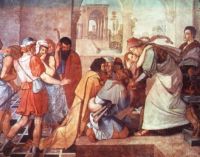 This was a talk Mark Dever gave at the T4G conference this past year that is relevant to many discussions, postings and conversations I’ve been having lately with many different people in person and on the internet. To sum this whole thing up, Dever says at the beginning of this talk, “People try to improve the Gospel. But in improving the Gospel they end up losing it.”
This was a talk Mark Dever gave at the T4G conference this past year that is relevant to many discussions, postings and conversations I’ve been having lately with many different people in person and on the internet. To sum this whole thing up, Dever says at the beginning of this talk, “People try to improve the Gospel. But in improving the Gospel they end up losing it.”
Improving the Gospel (MP3) – Mark Dever
And while this is a legitimate concern I share in seeing the quick descent of much of evangelicalism, we who would criticize those we see as doing some of the very things Dever speaks of must be careful how we 1) come across to those we are in disagreement with, 2) how we say things, 3) that we don’t let such a concern distract us from the cause of the Gospel itself by being absorbed in finger pointing, 4) use wisdom when approaching these situations, and finally 5) think carefully before you hit the send button about what you’re saying and how you’re saying it (Ben Davis).

 “When Joseph’s brothers saw that their father was dead, they said, ‘It may be that Joseph will hate us and pay us back for all the evil that we did to him.’ So they sent a message to Joseph, saying, ‘Your father gave this command before he died, “Say to Joseph, Please forgive the transgression of your brothers and their sin, because they did evil to you.” And now, please forgive the transgression of the servants of the God of your father.’ Joseph wept when they spoke to him. His brothers also came and fell down before him and said, ‘Behold, we are your servants.’ But Joseph said to them, ‘Do not fear, for am I in the place of God? As for you, you meant evil against me, but God meant it for good, to bring it about that many people
“When Joseph’s brothers saw that their father was dead, they said, ‘It may be that Joseph will hate us and pay us back for all the evil that we did to him.’ So they sent a message to Joseph, saying, ‘Your father gave this command before he died, “Say to Joseph, Please forgive the transgression of your brothers and their sin, because they did evil to you.” And now, please forgive the transgression of the servants of the God of your father.’ Joseph wept when they spoke to him. His brothers also came and fell down before him and said, ‘Behold, we are your servants.’ But Joseph said to them, ‘Do not fear, for am I in the place of God? As for you, you meant evil against me, but God meant it for good, to bring it about that many people When we read Scripture and particularly the Old Testament, it is so easy to automatically view those heroes of the faith, those glowing golden embossed characters we have all read about as kids as if they did no wrong. Sadly, a lot of times, we carry those portrayals with us into adulthood. Sure they made “mistakes,” the thinking goes, but they are people who kept their act together 99% of the time and are worthy of imitation as a result. And unfortunately, this is where we think the teaching stops.
When we read Scripture and particularly the Old Testament, it is so easy to automatically view those heroes of the faith, those glowing golden embossed characters we have all read about as kids as if they did no wrong. Sadly, a lot of times, we carry those portrayals with us into adulthood. Sure they made “mistakes,” the thinking goes, but they are people who kept their act together 99% of the time and are worthy of imitation as a result. And unfortunately, this is where we think the teaching stops. After these things God tested Abraham and said to him, “Abraham!” And he said, “Here am I.” 2 He said, “Take your son, your only son Isaac, whom you love, and go to the land of Moriah, and offer him there as a burnt offering on one of the mountains of which I shall tell you.” 3 So Abraham rose early in the morning, saddled his donkey, and took two of his young men with him, and his son Isaac. And he cut the wood for the burnt offering and arose and went to the place of which God had told him. 4 On the third day Abraham lifted up his eyes and saw the place from afar. 5 Then Abraham said to his young men, “Stay here with the donkey; I and the boy will go over there and worship and come again to you.” 6 And Abraham took the wood of the burnt offering and laid it on Isaac his son. And he took in his hand the fire and the knife. So they went both of them together. 7 And Isaac said to his father Abraham, “My father!” And he said, “Here am I, my son.” He said, “Behold, the fire and the wood, but where is the lamb for a burnt offering?” 8 Abraham said, “God will provide for himself the lamb for a burnt offering, my son.” So they went both of them together.
After these things God tested Abraham and said to him, “Abraham!” And he said, “Here am I.” 2 He said, “Take your son, your only son Isaac, whom you love, and go to the land of Moriah, and offer him there as a burnt offering on one of the mountains of which I shall tell you.” 3 So Abraham rose early in the morning, saddled his donkey, and took two of his young men with him, and his son Isaac. And he cut the wood for the burnt offering and arose and went to the place of which God had told him. 4 On the third day Abraham lifted up his eyes and saw the place from afar. 5 Then Abraham said to his young men, “Stay here with the donkey; I and the boy will go over there and worship and come again to you.” 6 And Abraham took the wood of the burnt offering and laid it on Isaac his son. And he took in his hand the fire and the knife. So they went both of them together. 7 And Isaac said to his father Abraham, “My father!” And he said, “Here am I, my son.” He said, “Behold, the fire and the wood, but where is the lamb for a burnt offering?” 8 Abraham said, “God will provide for himself the lamb for a burnt offering, my son.” So they went both of them together.